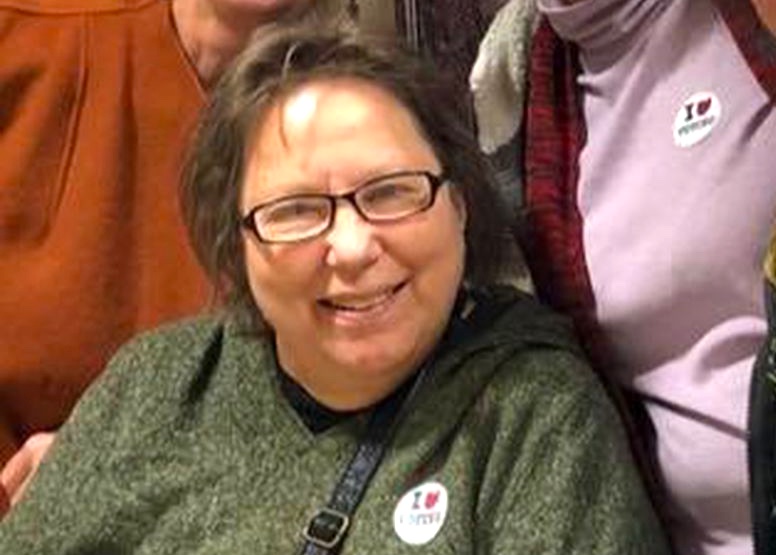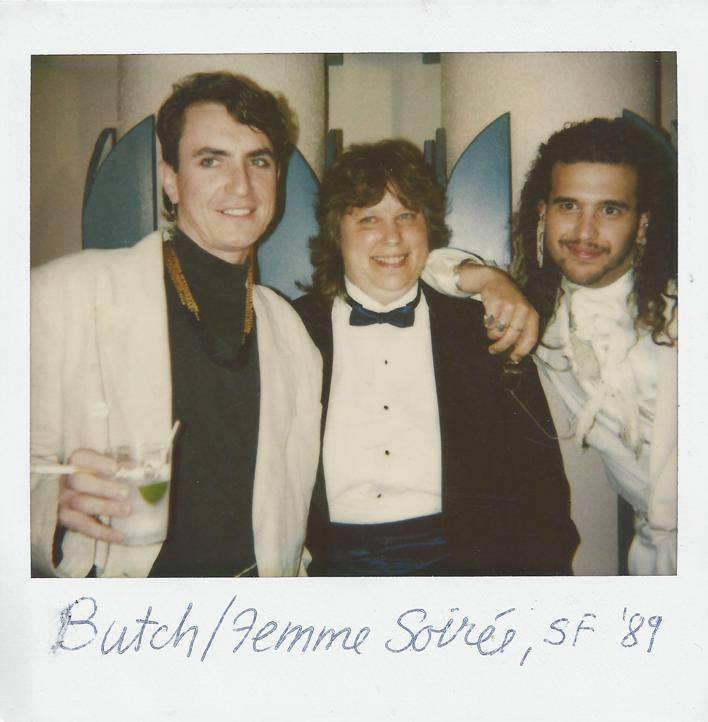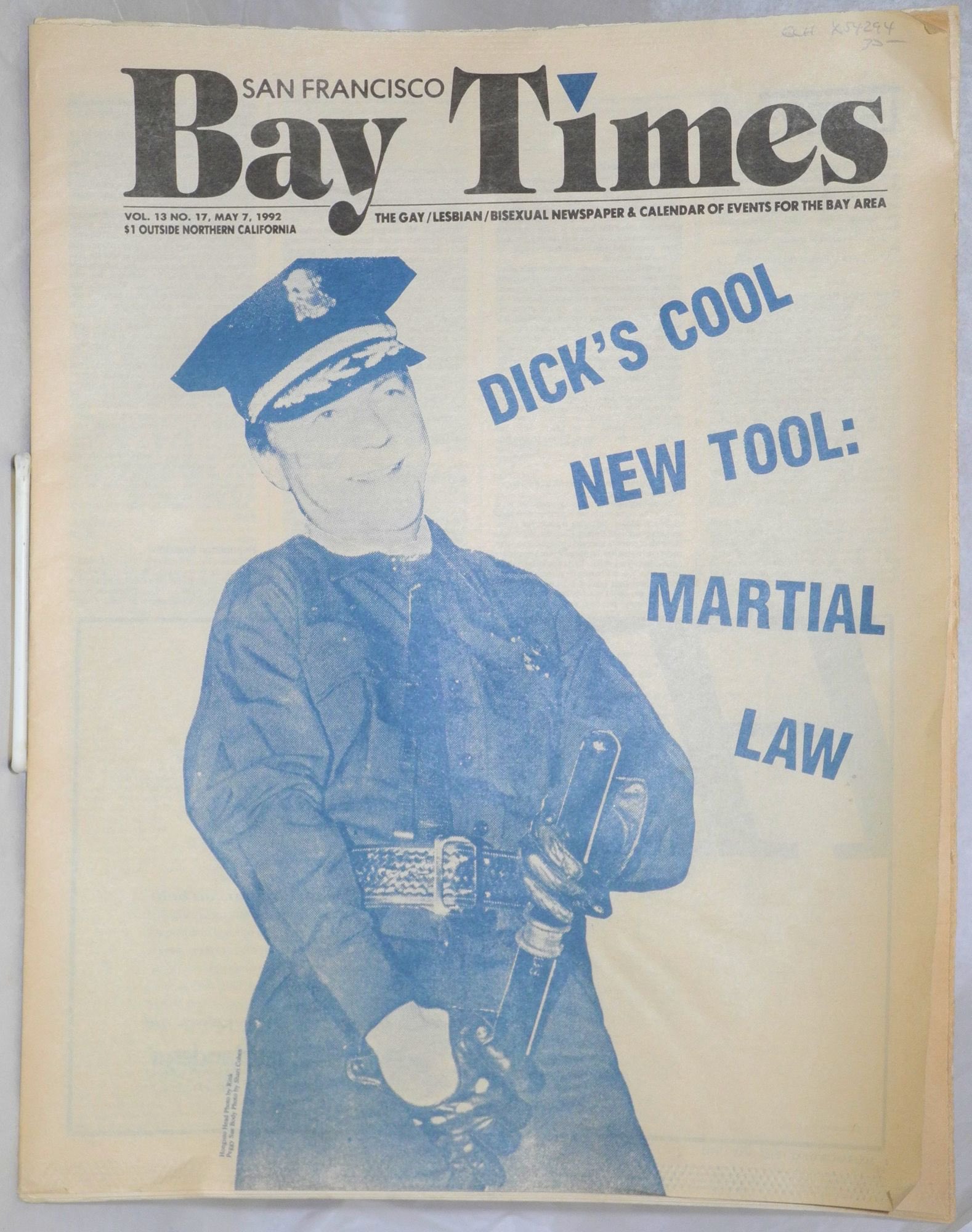Like any good newspaper publisher-editor worth their salt, Kim Corsaro—the publisher of the Bay Times from 1981 to 2011, who passed away this week after a long illness—was a bundle of contradictions. She was wondrous, infuriating, generous, bloody-minded, devious, mean, determined, obstinate, on point, and occasionally certifiable. I should know, I worked with her and for her for roughly eight years—and was eventually fired by her.
Where to start with her exploits? Perhaps with Cleve Jones literally following Corsaro around the office on his knees begging for her political endorsement. Or with Nancy Pelosi making the rounds of the all the papers knowing she damn well had to get the endorsement of the gay press, including Corsaro’s paper (more on that later). Or when the office, then on Valencia Street, ceased operations when the PG&E crew outside in the street took off their shirts to work, and the men working inside suddenly lost the ability to concentrate and just stared—a story that never failed to crack her up.
Or should we start when she decided that the gay establishment was doing nothing about domestic partnership (yes there was something before gay marriage) so she pushed it onto the front page to force them into action. Or when she went after Jim Geary of Shanti Project for sexual harassment allegations, or god forbid, questioned the saintliness of Ruth Brinker, founder of Project Open Hand.

Then there were the god knows how many times she bailed me out of jail when I got popped yet again by cops at a demo. Or one could start with her unwavering support of ACT UP, the AIDS Coalition To Unleash Power, and Queer Nation in an era when many thought ACT UP was going too far. (Yeah, I know everyone now says they supported ACT UP then, well some of ‘em are lying.) The list goes on.
In an era when gay papers—and I use the word “gay” deliberately—were liberal, at best, Corsaro was downright radical. She took over what was then known as Coming Up, a monthly what’s-coming-up (duh) list of events and turned it into a real gay/lesbian newspaper, with a devotion to local politics and in-depth reporting for the community. As HIV/AIDS decimated us, she was determined to cover the pandemic and do it without abandoning any of the things that made the city a refuge, a home and a center of everything the Christian Right hated. (Hello, artists like Jerome Caja and Gregg Taylor.) And she did it all from a radical queer, lefty perspective.
And let’s not forget, she did it as a woman in, at that time, a largely gay male community where all the other papers were run by men, and lesbians and gay men were largely two separate communities. She was obviously an out dyke. She suffered overt and covert sexism. She was substantially to the left of the publishers of both the Bay Area Reporter and the Sentinel which, at the time, were mainly outlets for gay men. And in an era where bisexuals were distrusted by many on both sides of the fence, she hired a snotty little bi punk like me, and not to long after added “bi” to the logo just to make that clear she was inclusive—she did the same thing with trans inclusion later. (Adding bi was a move that did not go down well with a certain section of the lesbian community, and she took heat for that too.)

To do this, she was tough. She had to be. She had the build and personality of a Sherman tank, and she needed it to deal with San Francisco politics, which, as those in it know, is and always was, a contact sport. She forced her way into the club. In the course of doing so she took no prisoners internally or externally. This didn’t necessarily make for a kind and gentle demeanor or a sweet work environment. Sometimes it didn’t. Sometimes it did. Like when I told her I can’t live on what you are paying me. She grinned and said, “Wondered when you were going to ask,” and doubled my salary.
She could be hell on wheels to work for, and at least two separate sets of staff members quit or were “let go” when they protested labor conditions at the paper. She successfully busted the Newspaper Guild local at the paper by letting go, harassing out, or firing all the union members who worked for her. Like many radical organizations and newspapers, she was good at calling out unfair labor practices elsewhere, but kept practicing them at home.
Help us save local journalism!
Every tax-deductible donation helps us grow to cover the issues that mean the most to our community. Become a 48 Hills Hero and support the only daily progressive news source in the Bay Area.
All that aside, she made the San Francisco Bay Times a newspaper to be reckoned with. I won’t say all by herself, because there was a damn good team of reporters, writers, editors, designers, freelancers, and sales folk she put together who created the paper through thick and thin. But her mark and character were all over it. And her sharp incisive writing, slammed out on deadline, was a wonder to behold. She managed to bang out endorsements that were well-written and well-argued in a tenth of the time I could. Her political instincts were generally right on the mark, and she minced no words.
At the same time she had her writers’ backs, and put up with their little quirks. Like when she was interviewing Pelosi and fidgeting with something as she talked, only to look down in horror and realize she was fiddling with a bindle of speed that some errant scribe had left on her desk, after a long night at the keyboard. A good-natured lecture was delivered about leaving certain items at home. She encouraged me and other writers to get out there on the streets and elsewhere, and when we got in trouble, she would back us to the hilt. The included against the cops.

Need I mention that she allowed, encouraged, and cracked up at the infamous 1992 “Dick’s Cool New Tool: Martial Law” cover, which featured a collage of activist Peggy Sue in cop drag as the police chief abusing a truncheon. It was a comment on police chief Richard “Dick” Hongisto’s mass arrests of demonstrators gathering to protest the Rodney King verdict. The SFPD to confiscate as many copies of the paper as they could get their hands on after that police chief told them to “look into the paper.” A huge kerfuffle followed, and Hongisto was fired.
I personally will always thank her and honor her for giving me the chance to be an investigative reporter. She took an unnecessary chance on me when I showed up on the doorstep of Coming Up! in the Castro, oh so many years ago, with a radio story as resume (yes, on brown magnetic tape) from KPFA, and she said, yeah, what the hell.
She allowed me to develop as a writer. She encouraged me to do in-depth reporting as an activist—but—accurate reporter, dealing with the intricacies of federal drug treatment trials and regimens. She allowed long pieces explaining opportunistic infections associated with AIDS. She was a happy to let me loose on drug companies price-gouging around HIV/AIDS when no one else was pointing that out. She let me go after the SFPD for their attacks on the community on October 6, on New Year’s Eve and more.
She understood that in the midst of an epidemic, journalistic objectivity was a fiction, yet demanded that I get the story and do it right and do it accurately. I was allowed 4,000, 8,000, 10,000-word long articles to go into depth that people actually looked forward to reading.
So, it is with a rather heavy heart I bang out this last story for Kim Corsaro and am particularly dismayed about the fact she died just as she was had made it back home to live again in San Francisco, her true queer home. She was one of a kind. A great editor. A great writer. A great publisher. She will be missed and must be honored.
Tim Kingston worked at SF Bay Times from 1987-1995




